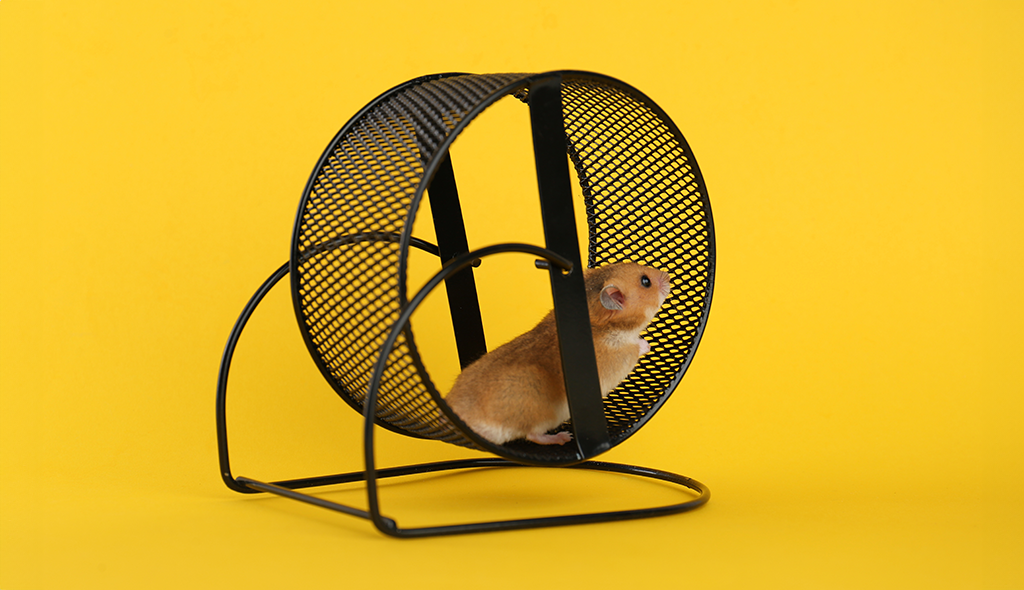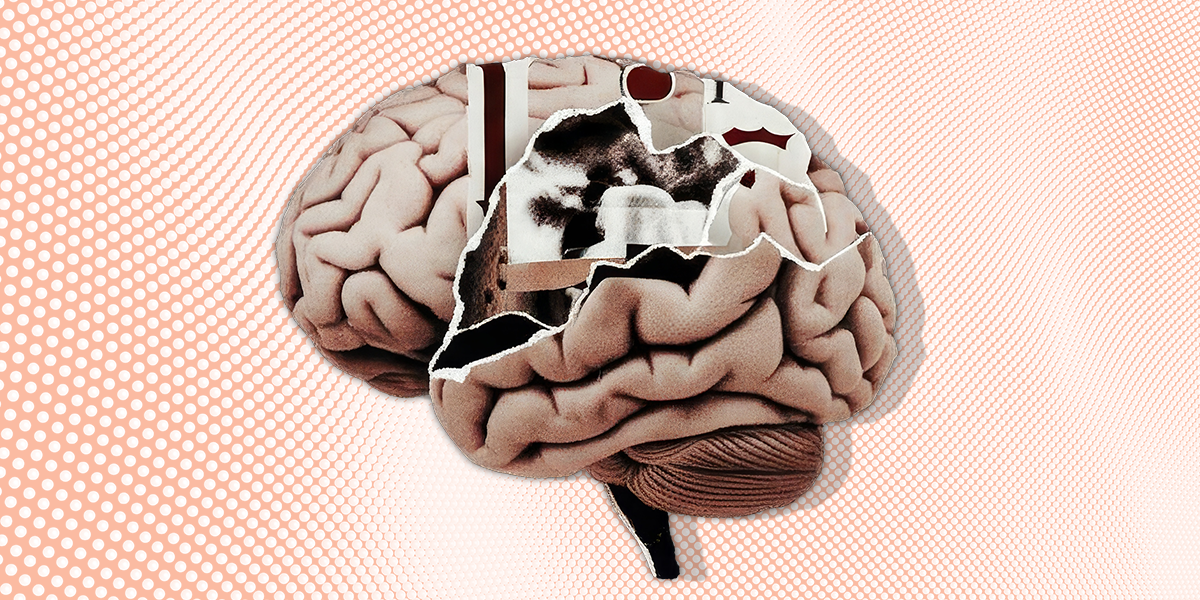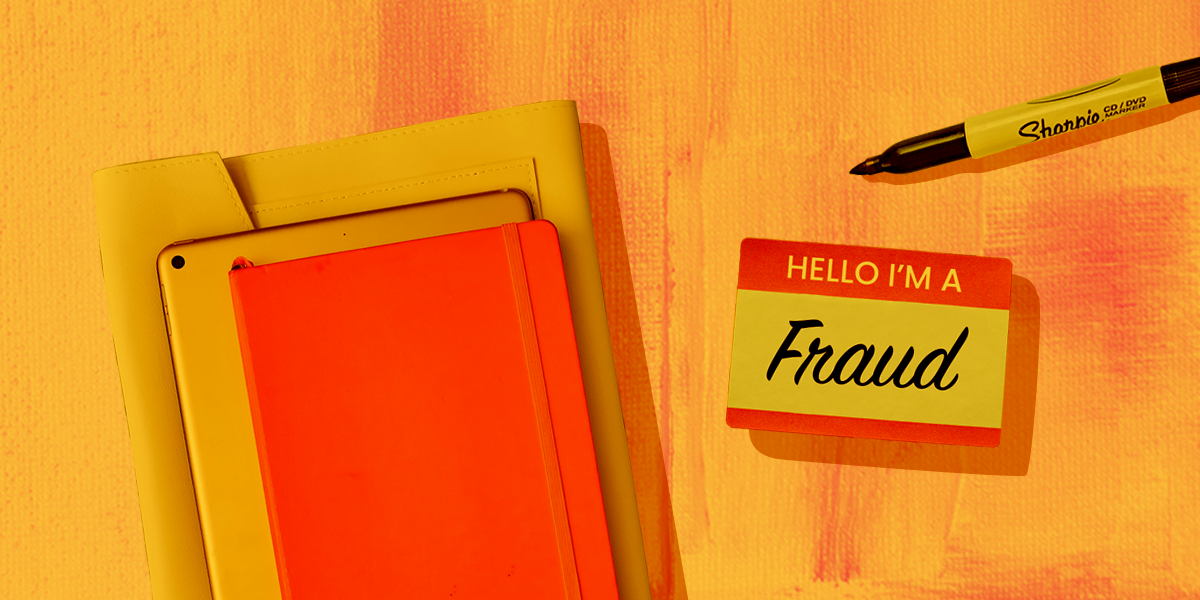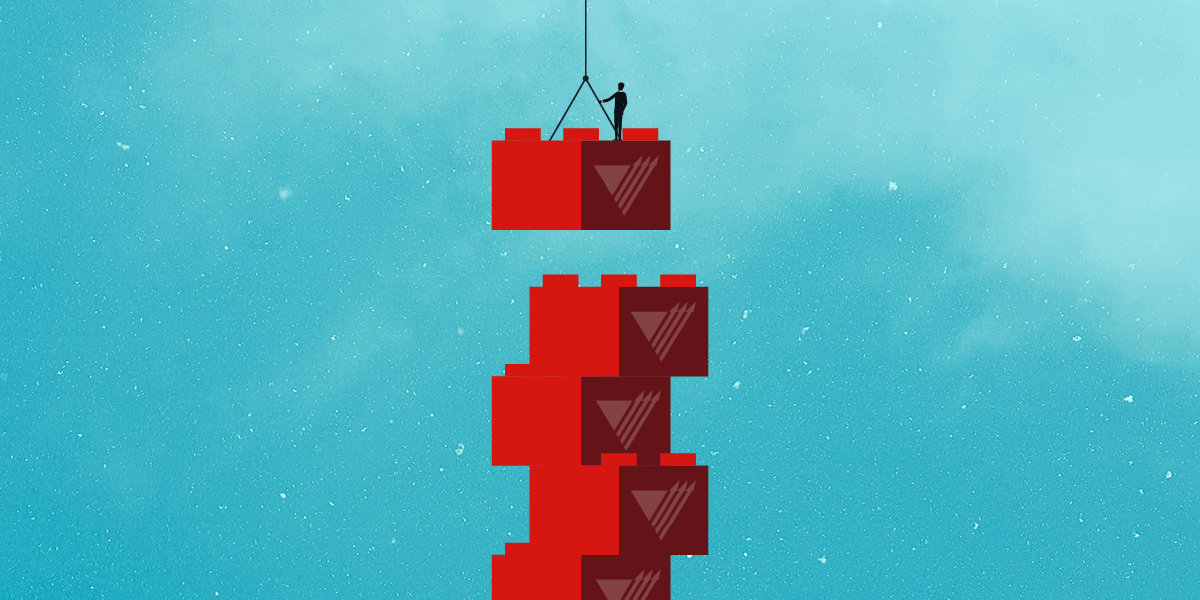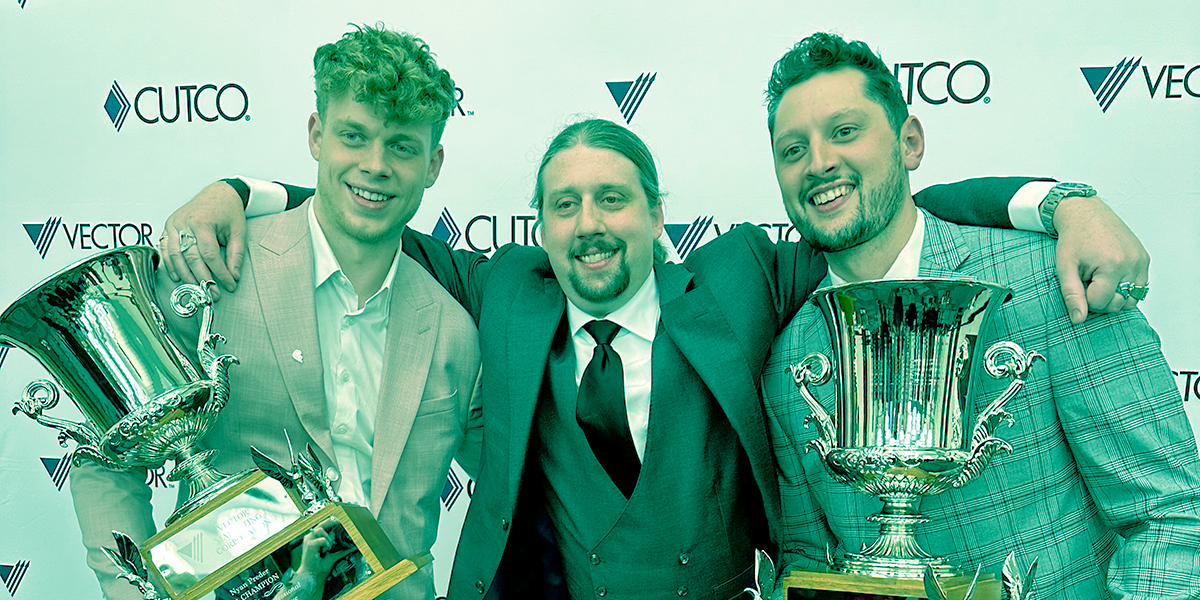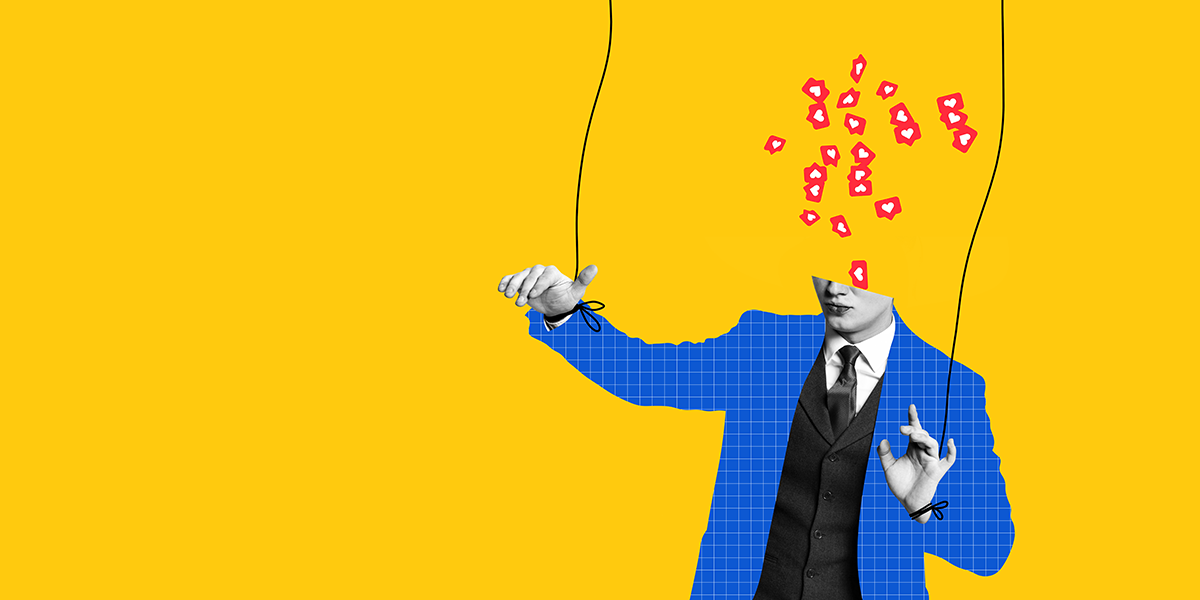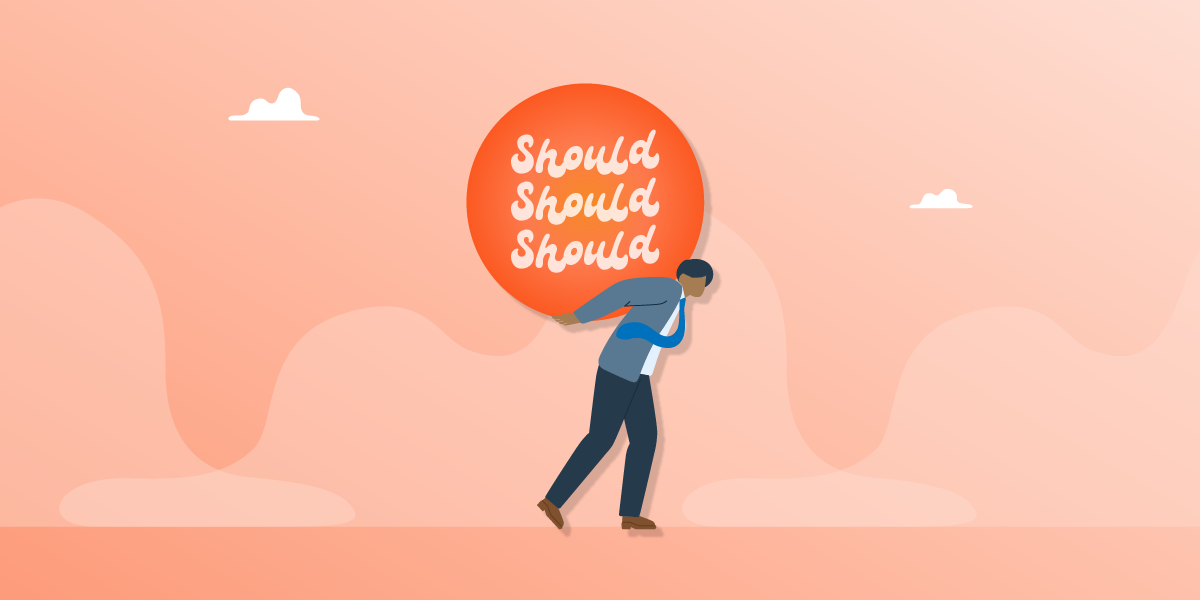
I could write an entire book about limiting beliefs. Oh wait, I already have—three of them.
The truth is, there’s no way to avoid them. You’ll wrestle with limiting beliefs your entire life because they’re simply a part of being human.
But you can take steps to shrink the role they play in your life and avoid turning them into death sentences (or self-fulfilling prophecies).
But what is a limiting belief, anyway?
I’d define it as a subjective belief that you’ve accepted as literal. A thinking trap that prevents you from living the life you want. These beliefs are sneaky, because they’re based on a distorted sense of reality—assumptions ingrained in you slowly, surely, and pervasively, since birth until the present moment.
Oof.
Not gonna sugarcoat it—it’s no small undertaking to dismantle these lies we tell ourselves.
But let’s give it a go. We’ll look at some common limiting beliefs, as well as some examples, and ways to overcome them.
Limiting belief #1: “I’ll be happy when…”

This idea, called external orientation, suggests that you can’t be happy until an external circumstance in your life changes.
Naval Ravikant said:
Desire is a contract you make with yourself to be unhappy until you get what you want.
All of us have some version of this contract in our minds. We suffer from the “I’ll be happy when…” fallacy.
Limiting belief example
- I’ll be happy when I get that new job
- I’ll be happy when I get rich
- I’ll be happy when I lose the weight and achieve my dream body
- I’ll be happy when I am in a loving and happy relationship
- I’ll be happy when I have fame and admiration
To reframe this, understand that you don’t want the outcome. You just want the feeling and emotion you associate with the outcome.
If you know you’re after the feeling itself, you can focus on feeling and behaving as if you already have what you want.
Or even better, you can look to find these feelings within yourself.
How to overcome this limiting belief
I’ll use relationships here because they’re a great example of the way you should re-frame your mindset to overcome the “I’ll be happy when” fallacy.
If you crave and desire strong relationships with other people, the first step is to develop a healthy relationship with yourself.
You get what you want by creating conditions where you aren’t emotionally dependent on another person.
You’ll attract healthy relationships the minute you’re so in love with yourself that you don’t even need to be in a relationship:
- Learn to enjoy your own company: Take yourself out to dinner, go to the movies alone, travel somewhere solo.
- Take time to be with yourself in silence: Enjoy solitude without distracting yourself by listening to music, checking your phone, or watching TV. Stop trying to drown out loneliness with noise. Learn to be alone and get comfortable with the discomfort of it.
- Cultivate a life you love: Develop hobbies you enjoy just because you enjoy them, get in shape just because you want to feel good, and learn new skills without needing them to “enhance your career.”
After taking steps like these, you love yourself more, and you’ve built an attractive lifestyle that others can enter into instead of you chasing others to fill the void.
When you’re secure, whether or not you’re in a relationship, you can then approach relationships in a healthy way.
When there’s someone you want to meet, you can simply walk up and talk to them because they just happen to catch your interest—not because you’re desperate to meet someone (which ironically makes you more attractive).
When you’re dating someone, you’re assessing whether or not they’re a good fit to be in your life just as much as you’re displaying your attractive qualities, because you don’t need things to work out.
It’s okay to want things. You shouldn’t rid yourself of all ambition. But make the outcomes the inevitable byproduct of how you live, rather than chasing them to fill a void.
Limiting belief #2: “I’d rather play it safe”
When it comes to accomplishing a goal or dream, there’s no worse limiting belief than “playing to avoid losing,” otherwise known as loss aversion.
Loss aversion prevents people from taking risks.
It is the cognitive bias where the pain of losing something is psychologically more intense than the pleasure of gaining something of equal value.
Getting ahead requires taking risks. Most people spend their entire lives trying to protect what they already have, which just keeps them stuck in the same cycle of living below their potential.
Limiting belief example
I have a coaching program that helps people start and grow online businesses using skills they have from their careers and past experiences. It costs $6,000, which is an amount of money some people literally don’t have or can’t afford to risk.
But often, I’ll be on a sales call with someone who can afford to work with me, but their primary concern is losing $6,000. I need to help them understand the potential upside of the investment so it outweighs their loss aversion.
I actually have an objection handle that flips loss aversion on its head, where I say:
Which are you more afraid of, losing money or being stuck in the same spot for another year?
This causes some people to take action and join.
One time, I was talking to a woman who was worried about risking the cash to work with me, but I knew her background would be a slam dunk when it came to business, so I strongly encouraged her to join.
She quietly agreed, without even telling her husband. She took a real risk.
It paid off. She ended up making $10,000 in her second month.
Had she let her fear of loss prevail, she wouldn’t have built her dream business. She later thanked me for saving her years of wasted time.
How to overcome this limiting belief
Don’t pump yourself up with some rah-rah motivational speech.
Learn how to appropriately assess risk.
I learned the idea of convexity—where a situation’s potential upside is far greater than the downside—from Nassim Taleb in his book, “Antifragile.”
Let’s take investing in my course as an example.
The worst-case scenario would be losing out on $6,000 and some costs associated with running the business. Let’s round it up to $10,000.
Also, you will risk six months of your life dedicated to growing the business.
You could ask yourself, would anything about your life—in the long run—fundamentally change if you took a swing and lost $10,000?
Would a six-month period of genuinely trying actually be such a bad thing when you’ve been living the same six months over and over, playing it safe, for your entire life?
Think through the worst-case scenario. If you can stomach the loss and you like the upside, take the bet.
My top clients have earned anywhere from $10,000 to $40,000 per month in six to 12 months. And they will have the skills to keep earning money with their business for the rest of their lives. Even the individuals who only signed a handful of clients have those money-making skills.
In the grand scheme of things, the upside is there.
I can attribute millions of dollars in revenue to the information I learned in courses and coaching programs that I paid anywhere from $200 to $25,000 for. I got a positive ROI on every single one.
In my case, I realized that if I didn’t change something, I would always be unable to afford the lifestyle I wanted, so I made some bets on courses that, at the time, I really couldn’t afford.
People suffer from the loss aversion limiting belief because they have a vague sense of fear and dread. When you get real specific on what you’re afraid to lose and whether or not you could stomach that loss, your fear goes down.
Limiting belief #3: “This is how I’ve always been”
This limiting belief drives people to stay stuck in the same patterns because they use the past as a blueprint for the future.
They take what has happened in their lives and use it as an explanation for why they are the way they are now.
This turns into a justification for staying the same, especially if they’ve tried to change in the past and failed.
You are under no obligation to be who you were yesterday, a month ago, a year ago, or who you have been your entire life.
Whether you realize it or not, you’re choosing to live the way you’re living.
Limiting belief example
I’m going to make a controversial statement and say that a lot of people who self-identify as introverts are using it to hide from developing social skills because they have social anxiety.
It’s a mindset problem.
The “forever shy person” has been quiet in social situations since childhood.
Maybe they were awkward in middle school, had few friends in high school, and struggled to connect with people in college.
Every uncomfortable interaction becomes evidence in their mental file labeled “I’m just not good with people.”
Because they believe they’re “naturally introverted,” they avoid situations that would actually build their social skills. They skip networking events, decline party invitations, and stay quiet in meetings.
Each time they avoid social interactions, it reinforces their belief that they’re “not a social person.”
They point to the past as proof:
I’ve always been shy. Even my family says I’m the quiet one. I tried to be more outgoing in college, but it ended up being awkward. This is just who I am.
Their subpar social abilities are a product of their choices, and further reinforced with every missed opportunity to practice (i.e., all those social situations they’ve been avoiding).
Social skills improve with repetition and conscious effort, just like any other skill. Their past social struggles don’t prove anything.
The person who avoids public speaking their entire life isn’t “naturally bad at presentations.” They simply never practiced giving talks.
The same logic applies to social interaction. The identity of “forever shy” is a choice that reinforces their current identity, not an unchangeable fact about their nature.
How to overcome this limiting belief
Whenever you’re trying to change an aspect of your personality that has been reinforced by your past, you must create a system that helps you adopt new behaviors, character traits, and even entire identity shifts.
The perfect example is Toastmasters.
I joined Toastmasters back in 2017. I’ve never had a problem with speaking in public.
I did it because I wanted to improve my speaking skills. But a lot of people in that class were terrified of public speaking. Also, they were terrible at it.
Many of them had a long history of being the forever-shy person.
Some of them admitted as much. They joined because they were tired of being held back in their lives—personally and professionally—because of this.
Toastmasters uses a form of gradual exposure therapy to help people become more comfortable with public speaking.
When you attend a meeting, you’re never pressured to speak, but they do provide opportunities that are simpler and easier than giving a full speech until you get more comfortable.
There are table talks, where you are given a random topic to talk about for 1-2 minutes. There are also different roles in the meeting, like the timer, general evaluator, table topics master, grammarian, and the official Toastmaster for the meeting. All of these roles provide opportunities to talk in short bursts instead of giving a long talk.
When you are ready to start giving speeches, you work through the Competent Communicator manual that has 10 speeches. The first speech is a short, 4-minute “about me” speech, and then each subsequent talk is slightly more challenging.
I have personally witnessed people going from visibly shaking on stage during speech one to delivering a solid talk by speech 10.
This is only one of example of an available resource that can help change past patterns and teach new behaviors.
Here are a few other ideas of how you could rewrite your story and overcome your past-self narrative:
- Take a business course or entrepreneurship program: Start with basic concepts to challenge beliefs about being “financially irresponsible” or “not business-minded.”
- Hire a personal trainer and commit to 3 months: Start with simple workouts to overcome the belief that you’re “naturally out of shape” or “not athletic” due to past gym failures. (I’m actually taking a training program to dunk a basketball for the first time in my life at age 36, and it looks like I’ll be able to do it.)
- Take an art class or learn to play an instrument: Try beginner classes and challenge the idea that you’re “not the creative type.”
When you break the spell of limiting beliefs about your past in one area, it has a cascading effect, and you start to break down these misconceptions in other areas, too.
Choose one limiting belief about yourself, based on the past, and create a system that challenges it through repeated practice (this works best with outside help, like Toastmasters or getting a coach).
Now that you’ve done it once, pick the next area you want to tackle. Wash, rinse, repeat.
Limiting belief #4: “I don’t belong here”
This is what I like to call the existential shame-guilt-death spiral. It’s an underlying sense of unworthiness that prevents people from getting what they want. Deeper than self-doubt, it’s almost always rooted in shame.
Instead of thinking you can’t succeed, some part of you believes that you shouldn’t succeed because you don’t deserve to succeed.
When you don’t think you deserve what you want, you’ll find ways to self-sabotage so you don’t get it. You’ll feel guilty when good things do happen to you because you don’t “deserve” it.
And then you’ll walk through life with this sense that you almost have to apologize for your existence.
It’s hard to define and untangle, but I’ll do my best to explain it here.
You’re walking around with this background hum of “I don’t belong here,” running through everything you do. It’s like you’re constantly trespassing in your own life. You feel guilty for taking up space, wanting things, or being visible in the world.
You literally feel guilty for existing, not because of anything you’ve done wrong, but because some part of you believes your presence itself is an imposition.
This can stem from a combination of sources, such as childhood experiences where your basic needs were treated as burdens. Or family dynamics where love felt conditional on being “good.”
You may have had early experiences of criticism that attacked your character rather than specific behaviors, like a teacher calling you lazy or disruptive without telling you what you actually did wrong.
Or trauma responses where you had to make yourself small to survive, like growing up in a household with an unpredictable or volatile parent, where drawing attention to yourself felt dangerous.
That’s the problem with this kind of shame. It develops before you’re aware enough to question it, so it becomes wired into your nervous system as truth rather than learned programming.
Limiting belief example
This limiting belief is tricky to pin down because it’s so nebulous, vague, and pervasive at the same time. It shows up as a collection of behaviors and feelings that seem unrelated on the surface. Here are some ways this belief manifests:
- You deflect compliments with “It was probably just luck” or “anyone could have done it” because accepting praise feels wrong
- You physically shrink in social situations…slouching, avoiding eye contact, speaking quietly, even when you have valuable input
- You feel guilty about your salary, success, or good fortune and worry you’re somehow “stealing” opportunities from more deserving people
- You constantly apologize for existing—saying sorry for walking past people, for your opinion, for asking questions, or even breathing too loudly
- You settle for mediocre relationships, jobs, or living situations because pursuing what you actually want feels selfish
- You feel anxious when good things happen, waiting for the “other shoe to drop”
- You avoid pursuing goals that would make you visible or successful because you’re afraid others will judge you for daring to want such things
The common thread through all of these is feeling guilty for existing.
How to overcome this limiting belief
Notice when you’re physically shrinking yourself because you can always check and fix your physiology. Hunched shoulders, whispering when you should be speaking normally, avoiding eye contact like you’re in trouble.
Your body language is basically advertising that you don’t believe you deserve to be here.
So practice doing the opposite in a way similar to the gradual exposure we talked about earlier. Stand up straight. Take up the space you’re actually entitled to. Project your voice.
Stop apologizing for existing. Get rid of the habit of saying sorry for every little thing. You don’t need to say sorry for walking past someone you didn’t even bump into, or asking a question, or doing literally anything that doesn’t harm another human being.
When you catch yourself doing this, ask “What exactly did I do wrong here?” Most of the time, the answer is absolutely nothing.
Start taking some risks with being visible.
Apply for jobs you actually want instead of settling for whatever feels “safe.” Accept compliments without immediately deflecting them.
Yeah, it’s uncomfortable at first. Do it anyway.
When you play small to avoid feeling guilty, you’re robbing the world of your gifts. Your success doesn’t take anything away from other people.
Limiting belief #5: “EVERYTHING is a high-stakes game”
The coup de grace of limiting beliefs is the belief that any of this really matters in the grand scheme of things. It’s taking life way too seriously.
We treat so many aspects of life like they’re a high-stakes game when life itself is a brief cosmic blessing that we’re lucky to experience at all.
You’re walking around clutching your reputation, your bank account, and your social status like they’re life-or-death matters when you’re literally a collection of atoms that somehow became conscious for maybe 80 years on a rock spinning through space at thousands of miles per hour.
The money you’re so afraid to risk? Can’t take it with you when you die.
The embarrassment you’re terrified of? Nobody cares, and nobody will remember—including you.
The only real consequence we face is wasting our ridiculously short time here, being afraid of things that fundamentally don’t matter.
You’re never going to look back on your deathbed and think, “I’m so glad I played it safe and worried about what strangers thought of me.”
You’re going to think, “Why the hell did I take it all so seriously?”
Every single person walking around, acting all stiff and proper, is missing the entire joke.
You are a cosmic miracle.
The odds of you existing at all are so astronomically impossible that it’s genuinely insane.
And what are you doing with this impossible gift? Worrying about whether someone thinks your business idea is stupid or if you’ll look foolish asking for what you want. Comical.
Limiting belief example
I see this happen all the time with writers and people who want to create content to build an online business.
Can’t tell you how many times I’ve run into a would-be writer who is petrified of anything that will damage their “writing career,” their reputation, or their social status.
They won’t post publicly because they’re afraid their friends or family are going to find out.
They don’t want to post on LinkedIn because they are worried their employer will see.
It’s madness.
The entire point of writing, at least for me, is to get your ideas out there and have fun with it.
If you post something and it flops, you can post something else.
But so many people in this space feel so much weight and gravity because people in general feel so much weight and gravity when it comes to their creative or professional work.
A lot of people who want to write, want to become artists, or want to become business owners are afraid of how they’ll look in the eyes of their peers—sometimes people they don’t even like—because they’re embracing an identity that’s no longer the tenured and respected corporate career person.
How to overcome this limiting belief
Remember that you’re going to die.
Not in a morbid way, but in a liberating way. Every embarrassing moment, every financial setback, every rejection…it all ends.
The slate gets wiped clean whether you played it safe or went for it.
Given that reality, why would you choose the boring option?
Start asking yourself:
“Will this matter in five years?”
For most things you’re worried about, the answer is absolutely not.
For the things that will matter—the relationships you didn’t pursue, the dreams you didn’t chase, the risks you didn’t take—those are the only real regrets.
Treat your life like the temporary, unrepeatable experiment it actually is.
You’re not here long enough to waste time being afraid of other temporary people’s temporary opinions about your temporary choices.
You’re going to be dust soon enough anyway. Might as well dream big, have some fun, and shoot your shot.
To go deeper on mindset and limiting beliefs, check out these articles:



